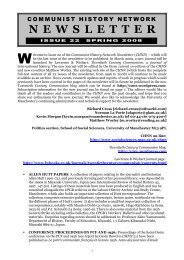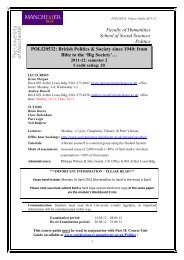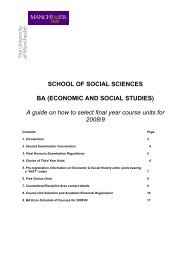second year course outlines 2012-2013 - School of Social Sciences ...
second year course outlines 2012-2013 - School of Social Sciences ...
second year course outlines 2012-2013 - School of Social Sciences ...
Create successful ePaper yourself
Turn your PDF publications into a flip-book with our unique Google optimized e-Paper software.
Priest, S. 2000. The Subject in Question: Sartre's Critique <strong>of</strong> Husserl in The<br />
Transcendence <strong>of</strong><br />
the Ego. London: Routledge.<br />
*Richmond, S. 2004. Introduction in Sartre, J-P. The Transcendence <strong>of</strong> the Ego, translated<br />
by<br />
A. Brown. London, Routledge, 2004.<br />
Stawarska, B. 2002. Memory and Subjectivity: Sartre in Dialogue with Husserl. Sartre<br />
Studies<br />
International 8 (2002) [O]<br />
*Wider, K. 1997. The Bodily Nature <strong>of</strong> Consciousness: Sartre and Contemporary<br />
Philosophy <strong>of</strong><br />
Mind. Ithaca: Cornell University Press, Ch.3<br />
Williford, K. 2010. Pre-Reflective Self-Consciousness and the Autobiographical Ego. In J.<br />
Webber, ed. Reading Sartre: On Phenomenology and Existentialism. London: Routledge.<br />
Zahavi, D. 2000. Self and Consciousness. In D. Zahavi, ed. Exploring the Self. Amsterdam:<br />
John Benjamins.<br />
29<br />
The Topic<br />
Phenomenology is intimately bound up with self-consciousness. Husserl makes reflection on<br />
one’s<br />
own experience a central component <strong>of</strong> phenomenological method. But what is<br />
selfconsciousness?<br />
In particular, is it the consciousness <strong>of</strong> a self? In Logical Investigations Husserl<br />
thought not, claiming that in reflection one is aware <strong>of</strong> conscious mental states, but not the<br />
experiencing self, or ‘ego’. However, he changed his mind, coming to argue that<br />
selfconsciousness<br />
involved a consciousness <strong>of</strong> the self/ego. Furthermore, he argued that the ego was<br />
transcendental. That is, it was a precondition <strong>of</strong> the possibility <strong>of</strong> experience. His reason for<br />
believing this was the Kantian one that the ego is a necessary condition <strong>of</strong> the possibility <strong>of</strong><br />
the<br />
unity <strong>of</strong> consciousness.<br />
Sartre argued against this later position <strong>of</strong> Husserl’s, claiming that the only sense in which<br />
we<br />
encounter an ego is as transcendent (not transcendental). He argues that the transcendental<br />
ego<br />
is not required to explain the unity <strong>of</strong> consciousness, and he tells a complex story about the<br />
relation between awareness <strong>of</strong> the ego, pre-reflective self-awareness, and reflective<br />
experience<br />
(self-consciousness). His position can be summed up by saying that the I is not something in<br />
consciousness but something for consciousness.<br />
Sartre’s view can be criticised by questioning whether he manages to account for the unity <strong>of</strong><br />
experience without a reliance on the transcendental ego, and whether his minimal account <strong>of</strong><br />
selfawareness<br />
can account for all aspects <strong>of</strong> self-conscious experience.<br />
The Reading<br />
In this reading Sartre both argues against Husserl’s position and presents his own account<br />
<strong>of</strong> the<br />
‘transcendence <strong>of</strong> the ego’. His arguments against the transcendental ego (that it is<br />
‘superfluous’<br />
and that it is ‘a hindrance’) are presented in a rather cursory way. His positive account <strong>of</strong> the<br />
transcendent ego is presented in much more detail. Sartre draws on a great deal <strong>of</strong><br />
Husserlian<br />
material that is not given much <strong>of</strong> an explanation. It is important to get clear in one’s mind<br />
the<br />
61

















